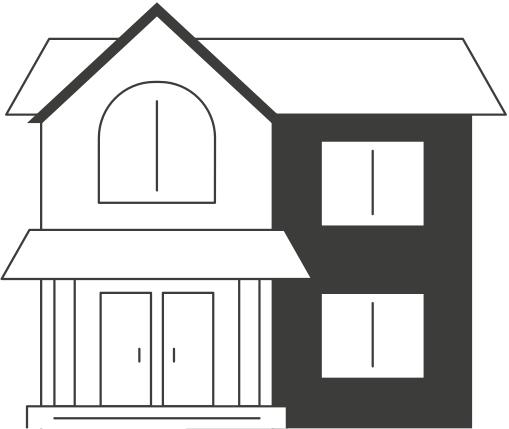Who Are the Parties Involved in a Typical Real Estate Transaction?

Primary Parties
- Seller:
The seller of the home may have decided to sell their home without an agent (a “For Sale By Owner” or “FSBO” home) but more typically works with a real estate agent to sell their home (the “Seller’s Agent” or “Listing Agent”).
- Seller’s Real Estate Agent:
A seller will typically hire a real estate agent to help them sell their home (when representing a seller, the real estate agent is referred to as the “Listing Agent”). For a fee (often 3% of the home’s sale price), the Listing Agent will list the seller’s home for sale on home sale platforms (“multiple listing services” or “MLS”), may stage the property, arrange photos, market the property, host open houses, arrange showings for buyers, negotiate the purchase contracts, and coordinate with third parties during the closing process.
- Buyer:
You as the buyer are the most important party to a real estate transaction, as you are the only one bringing money to the table.
- Buyer’s Lender:
Unless you are paying cash for the entire purchase price of the home, you will need to find a lender who will provide a loan (a “mortgage”) you can use to cover the purchase price of the home. The lender will require you to put a specified amount of your own cash towards the purchase price (the “down payment,” often 10-20% of the purchase price), and your loan will cover the rest.
- Buyer’s Real Estate Agent:
You may decide to have a real estate agent represent you in your home purchase. A traditional real estate agent may charge you 3% of the home’s purchase price to provide services such as researching and identifying potential properties of interest, scheduling and attending property viewings, addressing questions about property value and neighborhood, preparing and submitting offers, and managing the closing process (e.g. coordinating with the lender, escrow and title company, and seller’s real estate agent). Many homebuyers have become hesitant to hire traditional real estate agents as they often do much less work compared to the seller’s real estate agent, and the majority of their services can be easily handled by the homebuyer on their own.
List of Services
-
Seller:Item Link List Item 1
The seller of the home may have decided to sell their home without an agent (a “For Sale By Owner” or “FSBO” home) but more typically works with a real estate agent to sell their home (the “Seller’s Agent” or “Listing Agent”).
-
Seller's Real Estate Agent:Item Link List Item 2
A seller will typically hire a real estate agent to help them sell their home (when representing a seller, the real estate agent is referred to as the “Listing Agent”). For a fee (often 3% of the home’s sale price), the Listing Agent will list the seller’s home for sale on home sale platforms (“multiple listing services” or “MLS”), may stage the property, arrange photos, market the property, host open houses, arrange showings for buyers, negotiate the purchase contracts, and coordinate with third parties during the closing process.
-
Buyer:Item Link List Item 3
You as the buyer are the most important party to a real estate transaction, as you are the only one bringing money to the table.
-
Buyer's Lender:Item Link List Item 4
Unless you are paying cash for the entire purchase price of the home, you will need to find a lender who will provide a loan (a “mortgage”) you can use to cover the purchase price of the home. The lender will require you to put a specified amount of your own cash towards the purchase price (the “down payment,” often 10-20% of the purchase price), and your loan will cover the rest.
-
Buyer's Real Estate Agent:Item Link
You may decide to have a real estate agent represent you in your home purchase. A traditional real estate agent may charge you 3% of the home’s purchase price to provide services such as researching and identifying potential properties of interest, scheduling and attending property viewings, addressing questions about property value and neighborhood, preparing and submitting offers, and managing the closing process (e.g. coordinating with the lender, escrow and title company, and seller’s real estate agent). Many homebuyers have become hesitant to hire traditional real estate agents as they often do much less work compared to the seller’s real estate agent, and the majority of their services can be easily handled by the homebuyer on their own.
- The traditional buyer’s agent fee model is outdated and excessive.
Many modern homebuyers question the value of paying a 3% commission — which equates to $30,000 on a $1 million home. With new technology and an abundance of information at buyers’ fingertips, many buyers now locate their desired home on their own and can easily access publicly available valuation, property and neighborhood reports. What’s more, the traditional percentage-based commission model creates misaligned incentives: the more you pay, the more your agent earns — regardless of effort or value delivered. That means buyers are often stuck paying top dollar for inconsistent service.
- WiseBuy offers an alternative: flat-fee a la carte services where it matters most.
With WiseBuy, you get expert support on the most important part of the process — the offer and purchase contracts — without overpaying. For a flat $5,000, you’ll work with a Realtor® and attorney who will guide you through writing your offer, negotiating terms, and finalizing your contract. Once your offer is accepted, you’ll get a one-hour consultation to walk through the closing steps so that you can confidently handle the remaining parts of the process on your own. Want more help? You can add hourly consulting only when you need it—no bloated fees, no wasted dollars. Unlike traditional agents, WiseBuy’s transparent pricing ensures you only pay for the services you actually use—saving you money while giving you confidence where it counts.

Other Parties
Once your offer on a home is accepted, there will be a handful of other parties who will be involved in the process leading up to the closing of the transaction. WiseBuy’s easy homebuyer’s checklist and one-hour consultation call following offer acceptance will walk you through it all.
- Home Appraiser:
Your lender will require a home appraiser to estimate the fair market value of the home. Because your lender is providing a loan based on the expected value of the home, they want to ensure that the home is truly worth the amount you are paying for it. You will usually cover the cost of the appraisal, typically $300-$700 (or more), depending on factors like property size, location, the appraiser's expertise, property condition, demand, and urgency.
- Home Inspector:
You will likely want to hire a home inspector to examine the condition of the property and identify any issues. The inspector will provide a report outlining their findings, and depending on how the purchase contract was structured during the contract negotiation, you may be able to negotiate repairs or back out of the purchase if significant issues are found. The home inspection typically costs $300-$600 (or more), depending on factors like property size, location, the inspector's expertise, property condition, demand, and urgency. You are the home inspector’s client and can ask them to walk you through the report, answer your questions and provide advice.
- Title Company:
The “title” to a property is the legal document providing ownership of the property. A title company will research a property’s history to ensure that the current seller has the legal right to sell you the property and that there are no other claims of ownership on the property that may pose an issue to your ownership (a “Title Search”). The title company will provide a “Title Report” outlining their findings. You are the title company’s client and can ask them to walk you through the report, answer your questions and provide advice. In addition to the Title Report, your lender will require that you obtain “Title Insurance” in order to protect the lender against any losses that may arise from any future dispute over the property’s ownership, and you will likely want to obtain an owner’s policy which would protect you from the same. Title insurance typically costs 0.5%-1% of the home’s purchase price.
- Escrow Agent:
Once your offer is accepted, you will typically be required to pay an “earnest money deposit” (oftentimes 1%-3% of the home’s purchase price) in order to demonstrate your serious intent to purchase the property on the closing date, which will often be 30-45 days after offer acceptance. An “Escrow Agent” is a neutral third party who will hold your earnest money deposit and release it to the seller, or back to you, according to the terms negotiated in the purchase contract. They will also generally handle the closing logistics of the transaction, including the additional payments to be made to the seller and other third parties involved in the transaction at closing. In California, it is common for the title company to also serve as the Escrow Agent, rather than engaging a separate company as the Escrow Agent.
- Home Insurance Company:
You will likely want to obtain (and your lender will usually require you to obtain) homeowner’s insurance to protect against losses from damage to your home, property and belongings. You should compare quotes from various home insurance companies, and the cost will vary significantly based on factors like property size, location, property condition, and the type of coverages you want. The cost of homeowner’s insurance may average around $1,350 per year, but there is significant variance based on the aforementioned factors.
List of Services
-
Home Appraiser:Item Link List Item 1
Your lender will require a home appraiser to estimate the fair market value of the home. Because your lender is providing a loan based on the expected value of the home, they want to ensure that the home is truly worth the amount you are paying for it. You will usually cover the cost of the appraisal, typically $300-$700 (or more), depending on factors like property size, location, the appraiser's expertise, property condition, demand, and urgency.
-
Home Inspector:Item Link List Item 2
You will likely want to hire a home inspector to examine the condition of the property and identify any issues. The inspector will provide a report outlining their findings, and depending on how the purchase contract was structured during the contract negotiation, you may be able to negotiate repairs or back out of the purchase if significant issues are found. The home inspection typically costs $300-$600 (or more), depending on factors like property size, location, the inspector's expertise, property condition, demand, and urgency. You are the home inspector’s client and can ask them to walk you through the report, answer your questions and provide advice.
-
Title Company:Item Link List Item 3
The “title” to a property is the legal document providing ownership of the property. A title company will research a property’s history to ensure that the current seller has the legal right to sell you the property and that there are no other claims of ownership on the property that may pose an issue to your ownership (a “Title Search”). The title company will provide a “Title Report” outlining their findings. You are the title company’s client and can ask them to walk you through the report, answer your questions and provide advice. In addition to the Title Report, your lender will require that you obtain “Title Insurance” in order to protect the lender against any losses that may arise from any future dispute over the property’s ownership, and you will likely want to obtain an owner’s policy which would protect you from the same. Title insurance typically costs 0.5%-1% of the home’s purchase price.
-
Escrow Agent:Item Link List Item 4
Once your offer is accepted, you will typically be required to pay an “earnest money deposit” (oftentimes 1%-3% of the home’s purchase price) in order to demonstrate your serious intent to purchase the property on the closing date, which will often be 30-45 days after offer acceptance. An “Escrow Agent” is a neutral third party who will hold your earnest money deposit and release it to the seller, or back to you, according to the terms negotiated in the purchase contract. They will also generally handle the closing logistics of the transaction, including the additional payments to be made to the seller and other third parties involved in the transaction at closing. In California, it is common for the title company to also serve as the Escrow Agent, rather than engaging a separate company as the Escrow Agent.
-
Home Insurance Company:Item Link
You will likely want to obtain (and your lender will usually require you to obtain) homeowner’s insurance to protect against losses from damage to your home, property and belongings. You should compare quotes from various home insurance companies, and the cost will vary significantly based on factors like property size, location, property condition, and the type of coverages you want. The cost of homeowner’s insurance may average around $1,350 per year, but there is significant variance based on the aforementioned factors.


